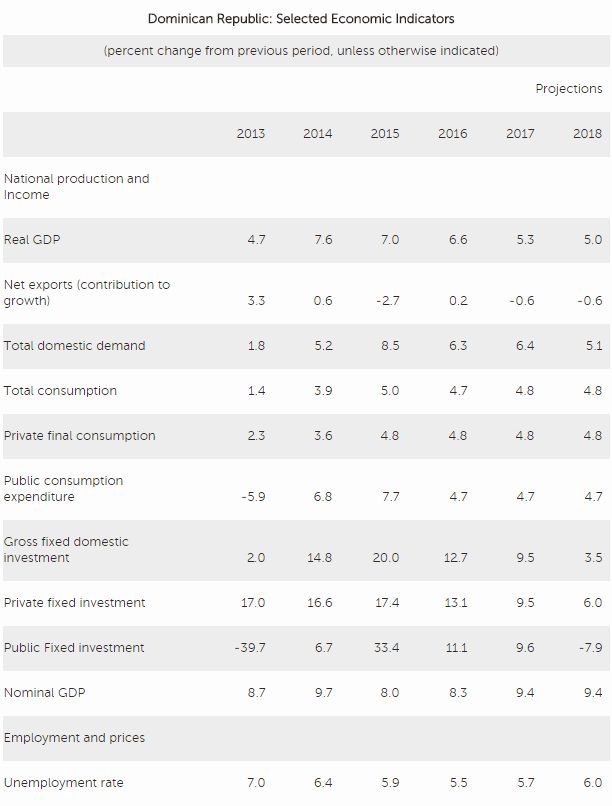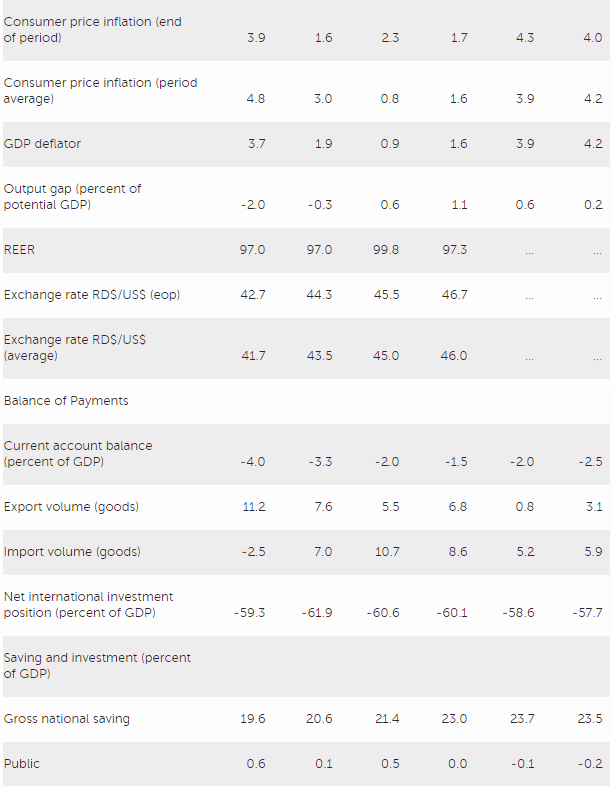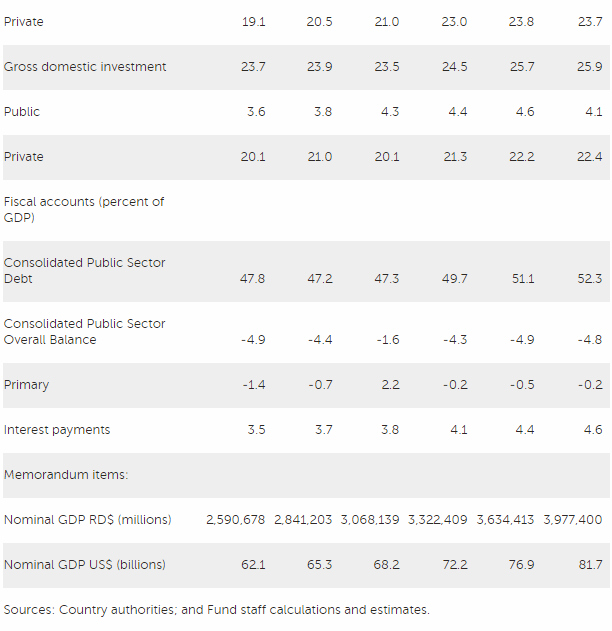IMF Executive Board Concludes 2017 Article IV Consultation with the Dominican Republic
On March 24, 2017, the Executive Board of the International Monetary Fund (IMF) concluded the Article IV consultation with the Dominican Republic.
The Dominican economy maintained the strong growth momentum of the past three years, which is only now beginning to taper off towards potential. Growth averaged 7 percent since 2014, outperforming most emerging markets and all the economies in the Americas, buoyed by domestic demand. Real GDP expanded by 6.6 percent in 2016, with both consumption and investment easing in the second half of the year as financing conditions tighten. Labor markets and social indicators are steadily improving, and real labor income has begun to catch up to strong productivity growth in the last two years, after remaining stagnant for over a decade.
Strong growth was accompanied by low inflation and a strengthened external current account, as lower oil prices kept pressures at bay. Headline and core inflation averaged 1¾ percent during 2016, remaining below the central banks’ inflation target range of 4±1 percent for over two years. More recently, inflation has begun to pick up with recovering food and fuel prices. The current account deficit narrowed significantly, to an estimated 1½ percent in 2016, as lower oil prices and a strong growth in tourism and remittances more than offset an underlying weakness in goods exports.
Fiscal and monetary policies tightened somewhat in 2016, providing a countercyclical offset to the positive output gap. The fiscal position improved slightly despite increasing spending pressures, as the authorities’ strong revenue administration effort had begun to pay off. The consolidated public sector registered a deficit of 4.3 percent of GDP in 2016, which pushed public debt to an estimated 49.7 percent of GDP by end-year. Monetary policy was tightened in November 2016 after remaining on hold for over a year. The policy interest rate was increased from 5 to 5½ percent to prevent potential overshooting of inflation, as commodity prices begin to unwind against a backdrop of a positive output gap and robust credit growth. Financial soundness indicators for the banking system remain strong, with healthy capitalization, low asset impairment and strong provisioning.
The economic outlook is favorable. Growth is expected to slow towards the potential rate of around 5 percent from 2017 onward, while the recent rise in fuel prices will push inflation to target and will widen the current account deficit moderately from 2017 onward. Risks around this baseline outlook are balanced. Key risks stem from the uncertainty surrounding the economic and policy outlook for the external trading partners, notably the U.S., the outlook for oil prices, higher than expected global interest rates and the ensuing dollar appreciation.
Executive Board Assessment
Executive Directors agreed with the thrust of the staff appraisal. They welcomed the Dominican Republic’s dynamic economic performance, as evidenced by sustained output and employment growth, low inflation and stronger current account. Directors commended the authorities’ pursuit of macroeconomic stability and structural reforms to improve social outcomes. They noted that the medium‑term outlook is favorable, but risks remain. Directors encouraged further efforts to consolidate the fiscal position, build larger buffers, strengthen policy frameworks, and advance structural reforms to promote inclusive growth.
Directors welcomed the authorities’ commitment to fiscal discipline and encouraged them to take early action to prevent a further buildup in debt, given the strong cyclical position of the economy. This would require containing the fiscal deficit this year and moving to meaningfully improve the fiscal balance over the next few years. In light of the heavy debt servicing burden, Directors welcomed the efforts to broaden the narrow tax base through renewed revenue administration reforms. They also encouraged more comprehensive reforms to sustainably broaden the base, simplify the tax system, and streamline tax exemptions and incentives. Directors saw scope for improving the quality of spending, especially on untargeted energy subsidies, while protecting pro‑poor and pro‑growth spending.
Directors agreed that strengthening the medium‑term fiscal framework will be critical to imparting discipline, predictability and credibility to fiscal policy. Recognizing various reform options, they noted that a medium‑term fiscal anchor would help guide fiscal policies, while simple and credible rules could support its implementation.
Directors viewed the current tightening bias of monetary policy as appropriate. Welcoming the authorities’ commitment to continue building reserves buffers, they encouraged a gradual transition to greater exchange rate flexibility to help absorb external shocks. Increased flexibility should be supported by efforts to build up foreign exchange market infrastructure, develop hedging instruments, and reduce balance sheet mismatches in the public sector.
Directors welcomed the health and stability of the banking system. They supported ongoing efforts to strengthen the regulation and supervision of nonbanks, bridge the remaining gaps in compliance with the international transparency initiatives, and enhance the macro‑financial framework. These reforms would identify and address emerging systemic risks, and ensure financial system’s continued support for economic growth.
Directors emphasized that far‑reaching structural reforms are needed to secure better longer‑term growth and social outcomes. They endorsed the ongoing focus on improving the quality of education and providing low‑income housing. Decisively addressing challenges of the electricity sector, including weak governance, poor infrastructure and below‑cost pricing is also critical. Directors supported the authorities’ efforts toward improving the business environment, strengthening institutions and governance, and supporting stronger employment growth and social protection.



Source: International Monetary Fund
- 353 reads
Human Rights
Fostering a More Humane World: The 28th Eurasian Economic Summi

Conscience, Hope, and Action: Keys to Global Peace and Sustainability

Ringing FOWPAL’s Peace Bell for the World:Nobel Peace Prize Laureates’ Visions and Actions

Protecting the World’s Cultural Diversity for a Sustainable Future

Puppet Show I International Friendship Day 2020

